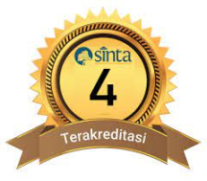The Effect of The Implementation of Worksheet Based-Problem Solving on Students’ Critical Thinking Skills in Rotational Dynamics and Elasticity
Abstract
Full Text:
PDFReferences
Arifin, Z. (2017). Mengembangkan Instrumen Pengukur Critical Thinking Skills Siswa Pada Pembelajaran Abad 21. The Original Research of Mathematics, 1, 92-100.
Arikunto, S. 2011. Prosedur Penelitian Suatu Pendekatan Praktik. Jakarta: Rineka Cipta.
Nessa Anugra Rahmi, dkk (2013) Pengaruh Lembar Kerja Siswa Berbasis PQ4R terhadapa Hasil Belajar IPA Fisika Kelas VIII SMP N 1 Linggo Sari Baganti, Pillar Of Physics Education, 2, 113-120
Depdiknas. (2008). Panduan Pengembangan Bahan Ajar. Jakarta: Direktorat Jendral Manajemen Pendidikan Dasar dan Menengah.
Gulo, W. (2002). Strategi Belajar Mengajar. Jakarta: Grasindo.
Afriyenti, D., Darvina, Y., & Dewi, W. S. (2019). Uji validitas LKS berbasis problem solving dalam meningkatkan keterapilan berfikir kritis pada materi fluida statis dan fluida dinamis kelas XI SMA/MA. Pillar Of Physics Education, 625-632.
Abdullah S, Ridwan. (2013). Inovasi Pembelajaran. Jakarta: Bumi Aksara.
Ikhwanuddin, dkk. (2010) Problem Solving dalam Pembelajaran Fisika untuk Meningkatkan Kemampuan Mahasiswa Berpikir Analitis, Jurnal Kependidikan. 9,
Arikunto, Suharsimi. (2005). Manajemen Penelitian. Jakarta: RinekaCipta.
Sugiyono. (2012). Metode Penelitian Kuantitatif, Kualitatif dan R&D. Bandung: Alfabeta.
Sudjana. 2011. Metoda Statika. Bandung: Tarsit
Pelita Br Karo (2018) Implementasi Model Pembelajaran Problem Solving Dalam Meningkatkan Hasil Belajar Siswa Mata Pelajaran Ips Pokok Bahasan Globalisasi Kelas Vi Sd Negeri 047175 Desa Simacem Bekerah Tahun Pelajaran 2017/2018. Jurnal Curere, 2, 122-132
Djamas, J. Kamus, Z. Murtiani, (2013). Analisis Situasi Aktivitas Pembelajaran Fisika Kelas X Sman Kota Padang Dalam Rangka Pengembangan Keterampilan Dan Karakter Berpikir Kritis Siswa. Jurnal Eksakta, 2, 25.
Hidayat, A dan Irawan, I (2017) Pengembangan Lks Berbasis Rme Dengan Pendekatan Problem Solving Untuk Memfasilitasi Kemampuan Pemecahan Masalah Matematis Siswa . Jurnal pendidikan Matematika, 1(2). 4
Zulhendra, Ahmad F dan Ratnawulan (2016) Pengaruh Lembar Kerja Siswa (LKS) Terintegrasi Energi Panas Bumi Terhadap Pencapaian Kompetensi Fisika Dalam Pembelajaran Ideal Problem Solving Pada Materi Usaha, Energi, Momentum dan Impuls di Kelas XI SMAN 10 Padang. Pillar Of Physics Education, 7, 113-120
Djamarah, B.S. dan. Zain, A. 2000. Guru dan Anak Didik dalam Interaksi Edukatif. Rineka Cipta. Jakarta.
DOI: http://dx.doi.org/10.24036/10144171074








